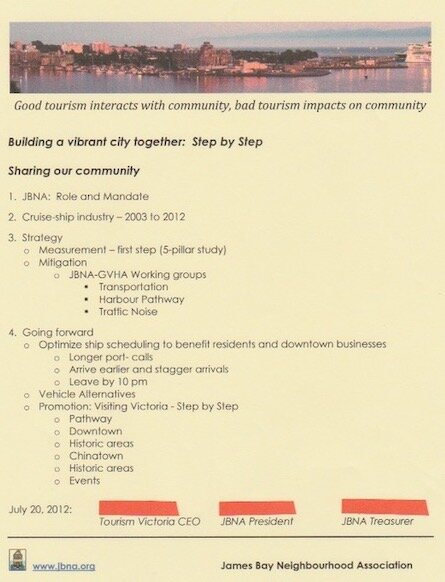What is Fair Sailing?
Fair Sailing advocates for cruise tourism practices that prioritize the interests of residents, local businesses, and the environment of Victoria and its cruise terminal’s host neighbourhood, James Bay.
We seek to maximize economic benefits to local businesses while minimizing the negative social, health, and environmental impacts from the annual arrival of over 300 cruise ships carrying almost one million passengers, overwhelming the resident population.
An Analysis of the 2025 Cruise Season - James Bay Neighbourhood Association [credit: JBNA, used with permission]
What does ‘Fair Sailing’ mean?
‘Fair Sailing’ is a fundamental rule of sailing based on the principles of good sportsmanship and fair play.
We adopted Fair Sailing to represent our expectation of cruise tourism practices in our residential neighbourhood. We advocate for the interests of residents, businesses, and the environment of Victoria, Canada's highest volume port-of-call.
Who is Fair Sailing?
Fair Sailing started as an initiative of the James Bay Neighbourhood Association (JBNA) in the spring of 2021 as part of their commitment to protect the local environment. In 2023, Fair Sailing became an independent volunteer initiative separate from JBNA. Fair Sailing registered as a not-for-profit society in 2024 and is operated by a group of local volunteers. Fair Sailing is a member of the Global Cruise Activist Network (GCAN).
Why are you doing this now?
James Bay has been advocating for more responsible cruise tourism practices since 2006. Issues of emissions, noise, traffic and overtourism have only gotten worse - it’s past time for genuine action.
Do you want to ban cruise ships?
Not at all. Residents enjoy interacting with stay-over tourists; giving directions, suggesting restaurants or speciality stores, or just getting to know each other. The James Bay Neighbourhood Plan acknowledges the positive contribution of tourism to our community and the City. Tourism has been part of the James Bay neighbourhood and Victoria for over 100 years - until recently, James Bay hosted more visitor overnight accommodation than downtown.
But we are overwhelmed by the unrestricted growth of cruise ship tourism into our neighbourhood. We want a sensible plan that allows for sustainable and responsible cruise ship tourism in Victoria while respecting local residents.
Is the Victoria City Council aware of the problems experienced in James Bay?
Yes, current and previous City Councils are well aware. Both JBNA and GVHA presented their views to Councillors in December, 2019. See the video for presentations and comments by Mayor and Councillors.
https://jbna.org/2019/12/jbna-presents-to-council-at-cruise-workshop/


